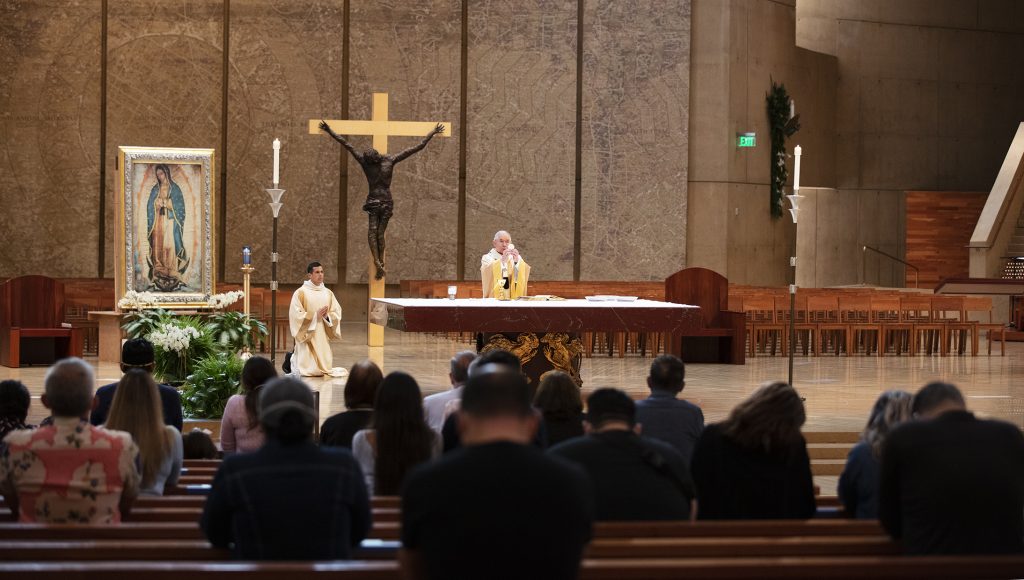“We cannot live without the Mass!”
That was the response of the Christians of Abitinae, in 304, when their interrogators asked why they exposed themselves to danger by meeting together on a Sunday.
Christianity was illegal in the Roman Empire: a capital crime, punishable by horrific torture and death. It had been proscribed by law since the time of the Emperor Nero, 2 1/2 centuries before.
The risks were great. Yet Christians were willing to take those risks. They were, in fact, impatient to take them, because life without the Mass was not life for them.
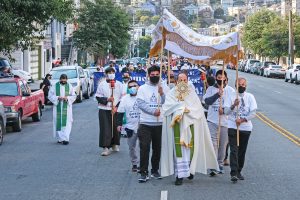
More than 17 centuries later, the story of the Martyrs of Abitinae has been told again, this time as the centerpiece of a letter from the Vatican’s Congregation for Divine Worship. Titled “Let Us Return to the Eucharist with Joy!” and written by the congregation’s prefect, Cardinal Robert Sarah, the letter received the approval of Pope Francis and was released to the bishops of the world on Sept. 11.
In its pages, Cardinal Sarah considers current events in light of the ancient story. He acknowledges the risks of attending Mass during a pandemic. But he ends by urging “a rapid and safe return to the celebration of the Eucharist.”
Soon after his letter appeared, bishops from throughout the United States and Europe echoed his plea.
Pope Francis had been among the first to raise the matter. When the churches in Rome reopened for Mass on May 22, he immediately stopped televising his daily liturgy. Through his spokesman he said he hoped people would “be able to return to communal familiarity with the Lord in the sacraments, participating in the Sunday liturgy and resuming, also in churches, the daily attendance of the Lord and his word.”
While all these members of the hierarchy pressed for a return to congregational gathering, they acknowledged that continued isolation might be necessary for people with a high level of vulnerability to the virus. Even in ordinary circumstances, people who have a contagious illness — and people who have severely compromised immune systems — are permitted and even encouraged to stay home.
The goal for all, however, should be the full return to the sacraments.
These events made the news. They’re recent, and they’re relevant. They mark an outward movement that’s observable in far-flung churches and people.
But they’re driven by an interior movement that was evident in the martyrs of Abitinae. It’s what drove them to say they could not live without the Mass. And it’s a longing as old as the world.
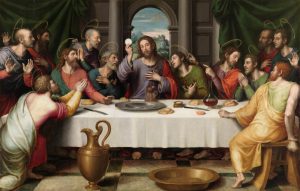
Adam and Eve were created for intimacy with God, but they lost the possibility when they disobeyed him and committed the original sin. They were banished from God’s presence.
By means of the ancient Law, God sought to give humanity a new means of approach. He gave Israel the gift of his special presence, first in the tabernacle in the wilderness and then in the Jerusalem Temple. He also taught his Chosen People how to worship, sacrificially, as a community.
Sacrifice is a practice common to all ancient religions, but modern Christians find it remote from their experience and difficult to understand.
The modern Jewish scholar Baruch Levine put it in simple terms. He described the Bible’s Book of Leviticus — which contains the laws for sacrificial worship — as etiquette for meals eaten in the presence of God.
Through the law God guided his people back to intimacy, inviting them to eat meals with him. This is what families do.
When Moses presented the law to Israel, he sprinkled the people with the blood of sacrificed animals, saying, “Behold the blood of the covenant which the LORD has made with you in accordance with all these words” (Exodus 24:8).
That blood sealed the covenant, the divine decree by which God created a family bond between himself and Israel.
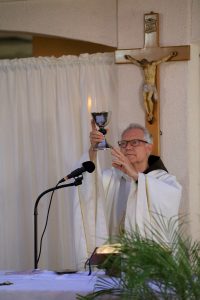
And then, the Book of Exodus tells us, the leaders of Israel “beheld God, and ate and drank” (Exodus 24:11). Because, again, this is what families do together: they eat and drink; they share meals.
These meals were very important. They were acts of worship that gathered and defined the community. To share at the table was to be within the covenant. To sin was to forfeit one’s place at the table — one’s place in the community and the covenant with God.
Great as these meals were, the people knew, however, that they were signs of something far greater. In Psalm 23, King David spoke of the Lord preparing a table for him, a place where his “cup overflows.”
In the Book of Proverbs, King Solomon wrote mysteriously about Wisdom’s banquet: “She has mixed her wine, she has also set her table. She has sent out her maids to call … ‘Come, eat of my bread and drink of the wine I have mixed’ ” (Proverbs 9:2–3,5).
The prophet Isaiah foretold a great banquet that would take place when the Messiah, the Christ, came to restore the fortunes of Israel: “On this mountain the LORD of hosts will make for all peoples a feast … a feast of wine on the lees … of wine on the lees well refined” (Isaiah 25:6).
And when the Messiah came, that anticipated banquet was his deepest desire. On the night of the Last Supper, Jesus told his disciples: “I have earnestly desired to eat this passover with you before I suffer” (Luke 22:15).
He said this immediately before he blessed bread and declared it to be his body, before he blessed a chalice of wine and declared it to be his blood. He broke the bread and gave it to the men who shared his table; and then he shared the chalice with them.
Echoing Moses, he called his chalice the “blood of the covenant” (Matthew 26:28). In a way Moses could not have imagined, Jesus’ disciples “beheld God, and they ate and drank.” And he commanded them to “Do this in remembrance of me” (Luke 22:19).
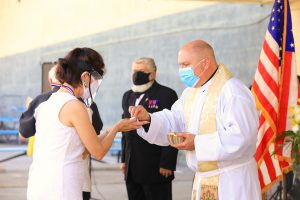
Three days later, again he showed his earnestness to share that meal. Just hours after he had risen from the dead, he found himself “at table” with two disciples. There “he took the bread and blessed, and broke it, and gave it to them,” and “was known to them in the breaking of the bread” (Luke 24:30,35).
His disciples were faithful to his command to “do this,” to re-present his sacrificial, covenantal meal. Their fidelity is evident in the Acts of the Apostles (Acts 2:42,46; Acts 20:7). It is evident in the Letter to the Hebrews, with its description of community worship that involves an altar and the blood of the covenant (Hebrews 12:24, 13:10).
And it is everywhere in the documents of the early Church Fathers. Christians, like their master, earnestly desired to eat that meal that God had foretold, and to eat it with God and the family of the Church.
There has always been risk involved. For the first 250 years of its existence, the Church was an outlaw organization. Underground Masses have been celebrated in every age, somewhere on earth.
There are risks involved in every activity. But Christians have always seen the Mass as an essential activity, worth great risks. Americans are venturing out now, after many months, for the most important things. The first among those things should be the worship that God established from the foundation of the world.
